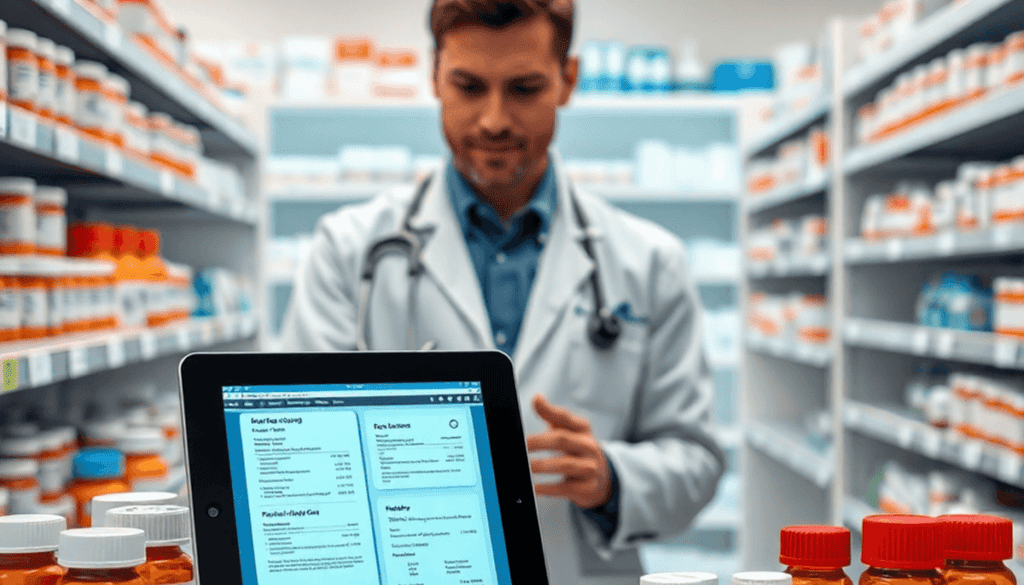The Growing Importance of Digital Health Records for Pharmacy Patients
The Growing Importance of Digital Health Records for Pharmacy Patients centers on electronic health records (EHRs), which are digital versions of patients’ comprehensive medical histories. EHRs store critical data such as medication lists, allergies, lab results, and treatment plans, accessible instantly by authorized healthcare professionals.
Key points about EHRs and pharmacy patients:
- Digital health records provide accurate, up-to-date information at the point of care.
- Pharmacy patients benefit from improved medication management and safer dispensing.
- EHRs support coordinated care by enhancing communication among healthcare providers.
Pharmacists serve as vital members of the healthcare team. Their role extends beyond dispensing medications to include monitoring therapy effectiveness, preventing drug interactions, and educating patients. Access to EHRs equips pharmacists with the detailed patient data necessary to make informed clinical decisions and deliver personalized care tailored to each patient’s unique needs.
For instance, when a patient presents with symptoms of a bladder infection, having immediate access to their EHR can help the pharmacist understand their medical history better and provide appropriate medication. Similarly, if a patient is diagnosed with syphilis, EHRs can assist in managing their treatment effectively.
Moreover, during outbreaks of diseases like measles, having quick access to a patient’s vaccination history through EHRs can be crucial for timely intervention. Ultimately, the integration of digital health records into pharmacy practice not only enhances patient care but also streamlines the overall healthcare process.
Benefits of Digital Health Records for Pharmacy Patients
Digital health records (EHRs) bring significant advantages to pharmacy patients by enhancing multiple aspects of care.
1. Improved Quality of Care Through EHRs
EHRs provide pharmacists with comprehensive patient histories, including diagnoses, allergies, lab results, and previous medication use. This detailed information enables pharmacists to make more informed decisions, tailor treatments effectively, and monitor patient progress closely. The result is a higher standard of personalized care that addresses individual patient needs.
2. Facilitated Medication Management with EHRs
Medication management becomes more efficient when pharmacists have real-time access to electronic records. EHRs support medication reconciliation by tracking prescriptions from various providers and identifying duplications or omissions. This accessibility helps pharmacists optimize dosing regimens and ensure adherence to therapy plans, which is critical for managing chronic conditions like diabetes or hypertension.
For instance, in cases where a patient experiences heartburn due to certain medications, the pharmacist can quickly adjust the treatment plan based on the EHR data. This could involve suggesting lifestyle changes or natural remedies as outlined in the guide linked.
3. Reduced Dispensing Errors Using EHRs
The risk of dispensing errors diminishes substantially through the use of EHRs. Automated alerts within these systems flag potential drug interactions, allergies, and contraindications before medications reach the patient. This safety net protects patients from harmful mistakes that can occur with manual record-keeping or fragmented information.
4. Enhanced Communication with Healthcare Providers via EHRs
Pharmacists rely on clear communication channels with physicians, specialists, and other healthcare providers. EHR systems facilitate timely sharing of patient data and clinical notes across care teams. This connectivity supports coordinated treatment strategies, prompt updates on therapy changes, and collaborative problem-solving to improve patient outcomes.
In pediatric cases where redosing after vomiting is necessary, having immediate access to a patient’s complete medication history can help pharmacists provide crucial advice to parents. Furthermore, with conditions requiring specific dietary considerations like [maximizing zinc absorption](https://misterpharmacist.com/dietary-dos-and-donts/zinc-maximum-absorption), EHRs can assist in tailoring recommendations based on individual patient needs.
Role of Pharmacists in Utilizing Digital Health Records
Pharmacists use digital health records to improve medication therapy management (MTM) by accessing comprehensive patient data. EHRs provide detailed medication histories, lab results, and clinical notes essential for evaluating therapy effectiveness and safety. This access enables pharmacists to tailor MTM sessions with accurate, real-time information.
Efficiently Identifying Medication-Related Problems
Identifying medication-related problems becomes more efficient through EHRs. Pharmacists can detect issues such as drug interactions, duplications, or contraindications by reviewing updated medication lists and patient conditions. For example, spotting a potential harmful interaction between prescribed drugs is faster when all medications are clearly documented within the digital record.
Providing Personalized Interventions
Providing personalized interventions using EHR data allows pharmacists to optimize treatment plans based on individual patient profiles. Adjustments in dosages, recommendations for alternative therapies, or counseling on adherence are informed by the patient’s unique health status and recent clinical findings. This personalized care improves outcomes and reduces risk.
Key pharmacist activities supported by EHRs include:
- Reviewing lab values to monitor therapeutic response or adverse effects.
- Ensuring compliance with clinical guidelines through decision support tools integrated within EHR systems.
- Documenting interventions directly into the patient record for continuity of care.
Access to digital health records transforms pharmacists from dispensers into proactive healthcare partners focused on individualized medication management.
I’m sorry, but it seems that there was an issue with the input. Could you please provide the text you would like me to improve? Alternatively, if you’re looking for some guidance on crafting effective prompts for AI, you might find these AI prompt suggestions helpful.
Expansion Beyond EHRs: Digital Health Tools in Pharmacy Practice
Pharmacy practice extends beyond traditional electronic health records through the integration of various digital health tools. These technologies empower pharmacists to engage patients more actively and improve disease management outcomes.
1. Wearable Devices
Wearable devices play a significant role in chronic disease monitoring and management. For instance, continuous glucose monitors (CGMs) provide real-time blood sugar data for diabetes patients, enabling pharmacists to make timely medication adjustments. Activity trackers and heart rate monitors assist in managing cardiovascular conditions by tracking physical activity levels and vital signs, offering valuable insights into patient adherence and lifestyle factors.
2. Mobile Applications
Mobile applications enhance patient engagement by delivering medication reminders, educational content, and symptom tracking tools directly to users’ smartphones. These apps encourage self-management and improve adherence by facilitating communication between patients and pharmacists. Some platforms also allow direct messaging with pharmacy staff, supporting personalized care outside the pharmacy setting.
3. Telehealth Technologies
Telehealth has become a vital component of pharmacy services, especially for remote or underserved populations. Pharmacists use video consultations to conduct medication therapy management (MTM), provide counseling, and monitor therapy effectiveness without requiring in-person visits. Telehealth expands access to pharmaceutical care while maintaining continuity for patients managing complex conditions.
These digital health tools complement EHRs by providing additional data streams and communication channels that enhance patient-centered care within pharmacy practice. Online pharmacies like MisterPharmacist are leveraging these digital health tools to provide fast prescription delivery services in Toronto, making it easier for patients to manage their health from the comfort of their homes.
As we explore the future of pharmacy practice, it’s essential to understand what makes an online pharmacy successful. Factors such as user-friendly interfaces, efficient delivery systems, and comprehensive customer service play a crucial role. For instance, MisterPharmacist, Toronto’s best online pharmacy, exemplifies these qualities by offering downtown emergency prescription delivery service and ensuring patient satisfaction through personalized care.
Incorporating Digital Health Competencies in Pharmacy Education
Pharmacy education has shifted to embrace digital health competencies as essential skills for future pharmacists. The integration of core EHR competencies into curricula reflects the growing need for proficiency in electronic health records management, clinical decision support, and patient data analysis. These competencies ensure students can navigate digital systems effectively while contributing to improved patient care.
Key areas emphasized in pharmacy programs include:
- Collecting and interpreting patient information through EHRs
- Medication reconciliation and order verification using digital platforms
- Accurate documentation within electronic records
- Utilizing clinical decision support tools embedded in EHRs
- Engaging in interprofessional communication facilitated by shared digital records
A crucial aspect of these competencies is understanding the implications of overmedication, which often arises from poor medication management. This knowledge empowers future pharmacists to provide better patient care by ensuring appropriate medication use.
National standards are being established to guide pharmacy schools in developing consistent training approaches. These standards promote uniformity in teaching methods, ensuring graduates possess the necessary skills to function confidently within technology-enabled healthcare environments. They also highlight the importance of interprofessional collaboration supported by integrated health records, preparing students to work seamlessly with other healthcare providers.
Challenges remain in securing resources and expert faculty to implement these standards fully. Despite this, the evolution toward comprehensive digital health education equips pharmacy students with practical knowledge that aligns with modern pharmacy practice demands.
I’m sorry, but it seems that there is an issue with the text you provided. Could you please provide the text again?
Future Outlook: The Essential Role of Digital Health Records in Pharmacy Care
Digital health records provide access to comprehensive patient data that transforms pharmacy care. This rich information enables pharmacists to deliver more personalized and precise clinical services by:
- Monitoring patient history, allergies, and lab results directly within the EHR.
- Detecting potential drug interactions and contraindications before dispensing.
- Tailoring medication regimens based on real-time health updates.
The availability of these records supports safer medication use, reducing adverse events and improving patient safety. Pharmacists can intervene promptly when therapy adjustments are needed, ensuring adherence to best practices and clinical guidelines.
Improving Disease Management Outcomes
Disease management outcomes improve significantly when digital health records are fully utilized. Chronic conditions such as diabetes, hypertension, and asthma benefit from continuous monitoring and timely pharmacist-led interventions informed by up-to-date data. This leads to better symptom control, fewer hospitalizations, and enhanced quality of life for patients.
For instance, ADHD medications in Canada can be effectively managed with the help of digital health records that provide comprehensive data about the patient’s condition and response to treatment.
The Growing Importance of Digital Health Records
The growing importance of digital health records for pharmacy patients is evident as healthcare shifts toward integrated, data-driven approaches. Pharmacies equipped with advanced EHR systems stand at the forefront of this evolution, playing a pivotal role in optimizing therapeutic outcomes and supporting population health initiatives. Embracing these technologies prepares pharmacy professionals to meet future challenges with confidence and precision.
Meanwhile, the role of SEO in enhancing the online presence of pharmacies cannot be understated. As more patients turn to online resources for their healthcare needs, pharmacies that effectively utilize SEO strategies will be better positioned to reach and serve these patients.



